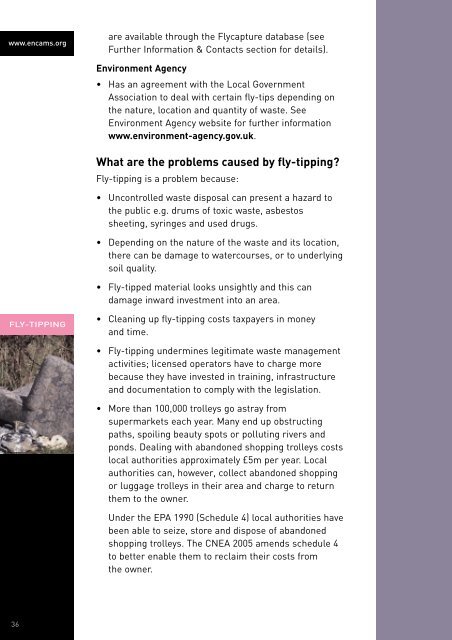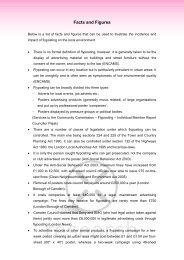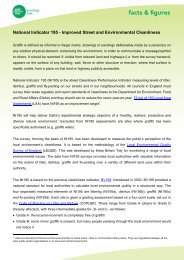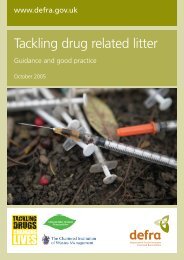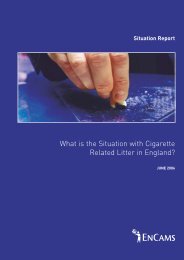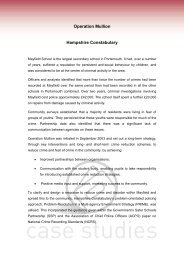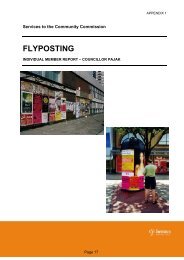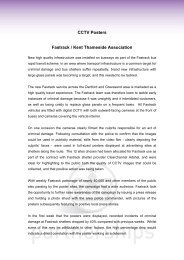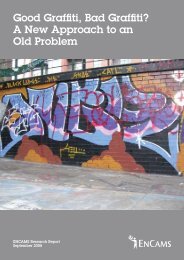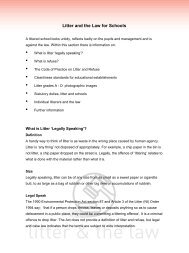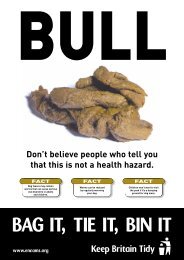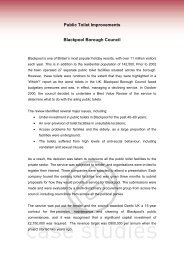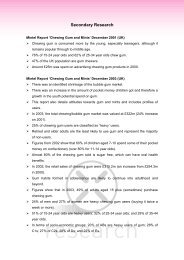a guide to improving your local environment - Keep Britain Tidy
a guide to improving your local environment - Keep Britain Tidy
a guide to improving your local environment - Keep Britain Tidy
Create successful ePaper yourself
Turn your PDF publications into a flip-book with our unique Google optimized e-Paper software.
www.encams.org<br />
are available through the Flycapture database (see<br />
Further Information & Contacts section for details).<br />
Environment Agency<br />
• Has an agreement with the Local Government<br />
Association <strong>to</strong> deal with certain fly-tips depending on<br />
the nature, location and quantity of waste. See<br />
Environment Agency website for further information<br />
www.<strong>environment</strong>-agency.gov.uk.<br />
What are the problems caused by fly-tipping<br />
Fly-tipping is a problem because:<br />
• Uncontrolled waste disposal can present a hazard <strong>to</strong><br />
the public e.g. drums of <strong>to</strong>xic waste, asbes<strong>to</strong>s<br />
sheeting, syringes and used drugs.<br />
• Depending on the nature of the waste and its location,<br />
there can be damage <strong>to</strong> watercourses, or <strong>to</strong> underlying<br />
soil quality.<br />
• Fly-tipped material looks unsightly and this can<br />
damage inward investment in<strong>to</strong> an area.<br />
FLY-TIPPING<br />
• Cleaning up fly-tipping costs taxpayers in money<br />
and time.<br />
• Fly-tipping undermines legitimate waste management<br />
activities; licensed opera<strong>to</strong>rs have <strong>to</strong> charge more<br />
because they have invested in training, infrastructure<br />
and documentation <strong>to</strong> comply with the legislation.<br />
• More than 100,000 trolleys go astray from<br />
supermarkets each year. Many end up obstructing<br />
paths, spoiling beauty spots or polluting rivers and<br />
ponds. Dealing with abandoned shopping trolleys costs<br />
<strong>local</strong> authorities approximately £5m per year. Local<br />
authorities can, however, collect abandoned shopping<br />
or luggage trolleys in their area and charge <strong>to</strong> return<br />
them <strong>to</strong> the owner.<br />
Under the EPA 1990 (Schedule 4) <strong>local</strong> authorities have<br />
been able <strong>to</strong> seize, s<strong>to</strong>re and dispose of abandoned<br />
shopping trolleys. The CNEA 2005 amends schedule 4<br />
<strong>to</strong> better enable them <strong>to</strong> reclaim their costs from<br />
the owner.<br />
36


